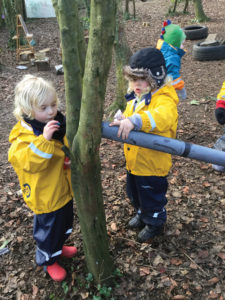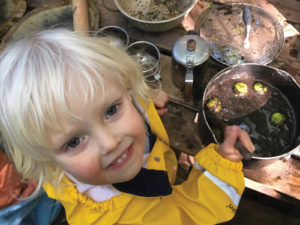by Lucy Collins
Bee in the Woods Forest School
What does being ‘school ready’ mean to you? Being able to write a name, recognise shapes or count to 20? With discussions in the media about baseline tests for four year olds and closing the attainment gap, let’s take a closer look at what school readiness might mean and what role the outdoors has to play in that.
A group of three and four year olds are playing a game at Forest School “We are ‘Mole Club’”, a little girl proudly exclaims as her friends join her in sitting inside a den made of sticks. The children are so engaged in play they don’t notice the drizzle or that we are running late for lunchtime.
Before ‘Mole Club’ there were other games – in the space of a morning we have been knights on stick horses, we have cooked carrot and mashed potato soup in the mud kitchen, made a home for a hedgehog (and discovered our home to be rented out by woodlice), celebrated a pretend birthday, we have searched for the longest stick and we have negotiated turns on the swing.
From the outside, this might look like ‘just play’. But play is serious learning! In a morning of play, we have developed language, practised our social skills, team worked, used our imaginations, thought about the world around us and how we can help it, used mathematical language to measure, explored mixing and pouring, used our senses, used our bodies – the list is endless!
All lea rning this morning was child-initiated through outdoor play. As Margeret McMillan puts it; “The best classroom and the richest cupboard is roofed only by the sky.”
rning this morning was child-initiated through outdoor play. As Margeret McMillan puts it; “The best classroom and the richest cupboard is roofed only by the sky.”
When are children ready for school?
In Scandinavian countries, children start school at seven, spending their early years before that playing and mastering the social and emotional skills needed for next steps. In this country, children are expected to be ‘school ready’ by four – with baseline assessments and phonics screening at five.
However, according to PACEY (Professional Association for Childcare and Early Years) research amongst parents and childcare professionals, school readiness means:
• Having strong social skills.
• Coping emotionally with being separated from their parents.
• Being relatively independent in their own personal care.
• Having a curiosity about the world and a desire to learn.
“A child can hold a pencil, write their own name, count to 100 or recognise all the colours and shapes, but if they don’t know how to make friends, manage their emotions, resolve conflict, to be independent and have self-help skills, none of the other stuff matters.”
The Curiosity Approach
A ‘school ready’ child needs to be confident with their peers, curious and comfortable in their space. Outdoor play often incorporates these skills naturally and in a way that allows the child to be independent and self-reliant. The opportunities to explore language, communication and ideas are abundant. The discovery of a budding flower or a wonky stick can lead to hours of imaginative, investigative, collaborative play!
Why outdoor play?
Early Years settings and schools are recognising the importance of outdoor play, with many embracing the Forest School ethos and providing amazing outdoor environments for little explorers.
 We live in a society where hours of endless outdoor play has been replaced by an indoor world of electronics. There have been many debates in the media about whether or not screen time has a negative effect on our children, but common sense would suggest that sedentary, solitary screen time cannot replace building dens and mixing mud pies when it comes to making memories!
We live in a society where hours of endless outdoor play has been replaced by an indoor world of electronics. There have been many debates in the media about whether or not screen time has a negative effect on our children, but common sense would suggest that sedentary, solitary screen time cannot replace building dens and mixing mud pies when it comes to making memories!
Being outside impacts on our well-being, mental health and sense of self – who doesn’t feel better after a brisk walk down by the sea or a walk in the woods? It is a place where we can balance understandingour world with self-discovery, risk taking, experimentation and exploration.
Through risky play such as climbing trees or balancing on logs, children learn about boundaries, self-regulation and keeping themselves safe. By taking risks, children learn about resilience, having a go and perseverance.
Outdoor play is fun, but will it help our child to be ready for school? Children learn with their whole body when outdoors – enabling muscles and brains to grow. By jumping, rolling, catching, balancing, hopping, stretching, twisting, leaping, grasping and gripping – children develop the important core strength and fine motor skills needed to start the journey towards sitting, focusing and writing.
Outdoor activity also engages children in a way that encourages them to have conversations and it is through these conversations that language, reasoning and problem solving skills grow. There is always something new and exciting happening outside – and the more that children have to talk about, the more the language skills are practised and refined.
Perhaps the term ‘school readiness’ should be changed to ‘life readiness’. If children have confidence in themselves and their abilities; if they are curious and excited about learning then academic skills will follow easily when they are ready.
Whatever age you believe is the right age for children to receive formal education, there can be no doubt that outdoor play gives them a sound (and fun!) base to build upon. So let’s get outside and play!
Bee in the Woods is a woodland preschool and community Forest School for three to seven year olds, based in Portslade.
For more information www.beeinthewoods.co.uk











